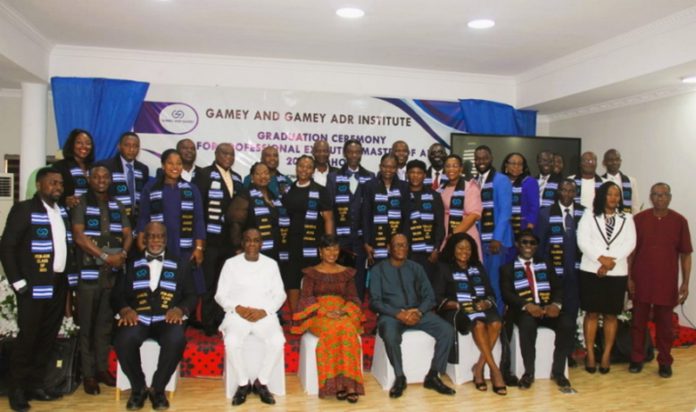The Chief Justice of Ghana, Justice Gertrude Sackey Torkornoo has assured private Alternative Dispute Resolution (ADR) training institutions, particularly the Gamey and Gamey ADR Institute, of enhanced partnership from the Judicial Service to promote quality ADR services and training across the country.
“Together, we can work to advance the goals of ADR and ensure that justice is made available to many more of our compatriots more speedily, more cost-effectively, and in keeping with the values of our traditional methods of dispute resolution,” she said.
The Chief Justice gave the commitment in her speech read by Justice Jennifer Abena Dadzie, a Court of Appeal Judge, at the graduation of Professional Executive Master of ADR (PEM-ADR) students from the Gamey and Gamey ADR Institute at Tema on Saturday.
The ceremony, which had the theme, “Taking ADR to the next level” witnessed the graduation of 29 professionals from diverse fields who have undergone 31 weeks of advanced training in ADR mechanisms.

Commending the Gamey and Gamey ADR Institute for its contribution to the growth of the ADR industry, the Chief Justice noted that the importance of having a skilled cadre of ADR professionals remains critical for a country like Ghana where traditional values of mediation, and reconciliation have long been cherished.
“By embracing ADR principles and practices, we not only uphold these cherished traditions, but also address the practical realities of a society grappling with diverse challenges and disputes,” she said.
By diverting certain disputes from the formal ADR court processes towards mediation, arbitration, and other ADR mechanisms, she said ADR reduces the pressure of the heavy caseload on the judiciary, and empowers individuals and communities to actively participate in the resolution of their conflicts.
In addition to promoting social cohesion and access to justice, she indicated that ADR holds the potential to unlock economic opportunities and foster sustainable development.
She lauded the course content of the Gamey and Gamey ADR Institute, adding that the utilisation of innovative ADR techniques and modules such as Appreciative Inquiry, PULSE Discovery, Self-Mediation, Managerial and Executive Mediation, and Med-Arb, underscores the Institute’s commitment to staying at the forefront of ADR practice.
“These tools not only enhance the effectiveness of ADR processes, but empower practitioners to address complex disputes with confidence and expertise,” she stressed.
The Chief Justice also commended the Institute, which is a subsidiary of the Gamey and Gamey Group, for the partnership with the Court-Connected ADR Programme of the Judicial Service which offers graduates the opportunity to undergo mediation internships at the courts, and be engaged as Court Mediators.
She congratulated the 25th PEM-ADR cohort members for completing their course and urged them to uphold professionalism in their ADR practice.
Mr Austin Gamey, CEO of Gamey and Gamey Group, in his address, noted that adopting ADR mechanisms, particularly mediation, is the surest way of ensuring that differences are resolved in a civilized manner, as ADR ensures expeditious, confidential, and inexpensive resolution of conflicts in an amicable manner that protects and promotes relationships.
“In that respect, we encourage institutions, corporate organisations, professional bodies, social associations and religious bodies to set up internal mediation offices or units, manned by trained mediators to help in resolving internal disputes.
“External mediators can be sought to man these units, or selected staff can be trained to serve in these mediation units. Additionally, CEOs, Managers and Supervisors can be trained and equipped with the skills to engage in managerial mediation to resolve disputes among their sub-work colleagues.”
For the educational sector, he announced that the Gamey and Gamey Group, in collaboration with its partners, will this year launch a Youth Conflict Resolution and Peer Mediation Programme through which Mediation Clubs would be established in secondary schools to create ADR awareness and equip young people with Peer Mediation skills to resolve disputes among their peers in school and the community.
“It is our contribution in promoting ADR in Ghana and beyond, and in ensuring that the younger generation becomes conscious of amicable ways of resolving disputes,” he stated.
Dr Fidelis Patrice Seddoh, a commissioner of the National Labour Commission, who chaired the event, congratulated the graduands, and reminded them of the need to continue to build their practical skills to enable them to help parties to resolve cases effectively.
Mr Sebastian Adama, the Cohort president, in his address, described the training programme as transformational, explaining that it offered them a significant learning experience, focusing on ADR specialisation and the importance of communication in preventing and resolving disputes.
“The course has equipped us with valuable skills for the benefit of our families, organisations, society, and the nation in general,” he said.

